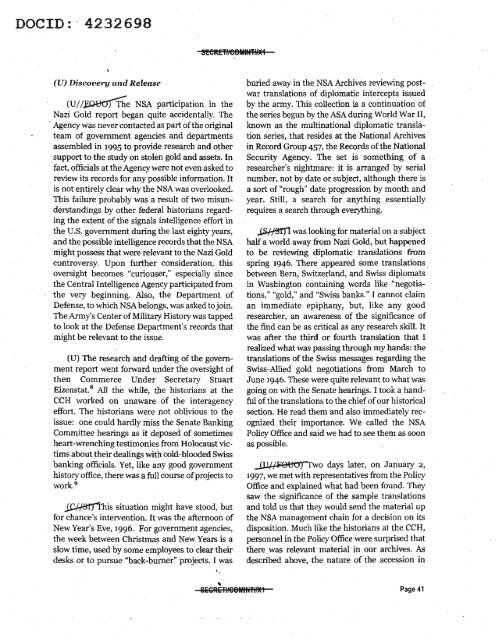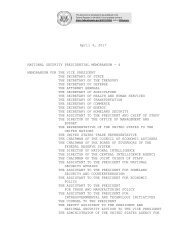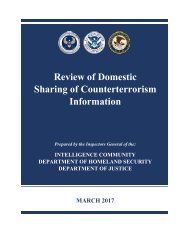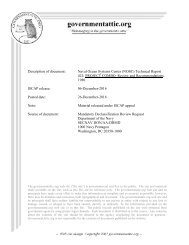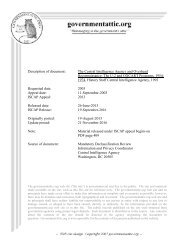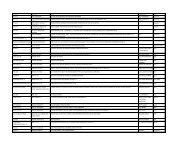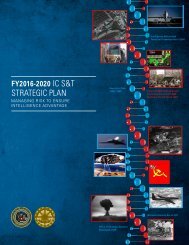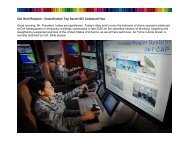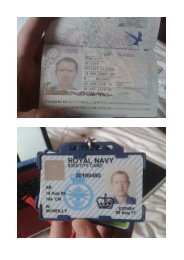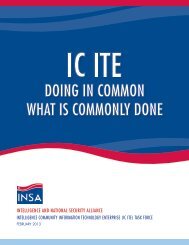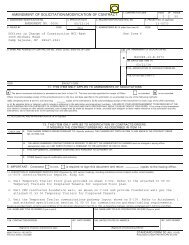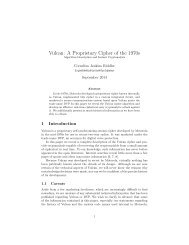government undersecretary
nsa-nazi-gold
nsa-nazi-gold
Create successful ePaper yourself
Turn your PDF publications into a flip-book with our unique Google optimized e-Paper software.
DOCID: · 4232698<br />
SEeftEfr'leeMIN'fH)(1<br />
· (V) Disco1'ery and Releast•<br />
(U I /~e NSA participation in the<br />
Nazi Gold report began quite accidentally. The<br />
' Agency was never contacted as part of the original<br />
team of <strong>government</strong> agencies and departments<br />
assembled in 1995 to provide researchand other<br />
support to the study on stolen gold and assets. In<br />
fact, officials at the Agency were not even asked to<br />
review its records for any possible information. It<br />
is not entirely clear why the NSA was overlooked.<br />
This failure probably was a result of two misunderstandings<br />
by other federal historians regarding<br />
the extent of the signals intelligence· effort in<br />
the U.S. <strong>government</strong> during the last eighty years,<br />
and the possible intelligence records that the NSA<br />
might possess that were relevant to the Nazi Gold<br />
controversy. Upon further consideration, this<br />
oversight becomes "curiouser," especially since<br />
the Central Intelligence Agency participated from<br />
the very beginning. Also, the Department of<br />
Defense, to which NSA belongs, was asked to join.<br />
The Army's Center of Military History was tapped<br />
to look at the Defense Department's records that<br />
might be relevant to the issue.<br />
(U) The research and drafting of the <strong>government</strong><br />
report went forward under the oversight of<br />
then Commerce Under Secretary Stuart<br />
Eizenstat. 8 All the while, the historians at the<br />
CCH worked on unaware of the interagency<br />
effort. The historians were not oblivious to the<br />
issue: one could hardly miss the Senate Banking<br />
Committee hearings as it deposed of sometimes<br />
heart-wrenching testimonies from Holocaust victims<br />
about their dealings with cold-blooded Swiss<br />
banking officials. Yet, like any good <strong>government</strong><br />
history office, there was a full course of projects to<br />
work. 9<br />
~is situation might have stood, but<br />
for chance's intervention. It was the afternoon of<br />
New Year's Eve, 1996. For <strong>government</strong> agencies,<br />
the week between Christmas and New Years is a<br />
slow time, used by some employees to clear their<br />
desks or to pursue "back-burner" projects. I was<br />
buried away in the NSA Archives reviewing postwar<br />
translations of diplomatic intercepts issued<br />
by the army. This collection is a continuation of<br />
the series begun by the ASA during World War II,<br />
known as the multinational diplomatic translation<br />
series, that resides at the National Archives<br />
in Record Group 457, the Records of the National<br />
Security Agency. The set is something of a<br />
researcher's nightmare: it is arranged by serial<br />
number, not by date or subject, although there is<br />
a sort of "rough" date progression by month and<br />
year. Still, a search for anything essentially<br />
requires a search through everything.<br />
JSHSt}l was looking for material on a subject<br />
half a world away from Nazi Gold, but happened<br />
to be reviewing diplomatic translations from<br />
spring 1946. There appeared some translations ,<br />
· between Bern, Switzerland, and Swiss diplomats<br />
in Washington containing words like "negotiations,"<br />
"gold," and "Swiss banks." I cannot claim<br />
an immediate epiphany, but, like any good<br />
researcher, an awareness of the significance of<br />
the find can be as critical as any research skill. It<br />
was after the third or fourth translation that I<br />
realized what was passing through my hands: the<br />
translations of the Swiss messages regarding the<br />
Swiss-Allied gold negotiations from March to<br />
June 1946. These were quite relevant to what was<br />
going on with the Senate hearings. I took a handful<br />
of the translations to the chief of our historical<br />
section. He read them and also immediately recognized<br />
their importance. We called the NSA<br />
Policy Office and said we had to see them as soon<br />
as possible.<br />
.J.J I//P:9{:10)"'"I'wo days later, on January 2,<br />
1997, we met with representatives from the Policy<br />
Office and explained what had been found. They<br />
saw the significance of the sample translations<br />
and told us that they would send the material up<br />
the NSA management chain for a decision on its<br />
disposition. Much like the historians at the CCH,<br />
personnel in the Policy Office were surprised that<br />
there was relevant material in our archives. As<br />
described above, the nature of the accession in<br />
~<br />
8E6REli'J68MIN'fH)(1 Page 41


